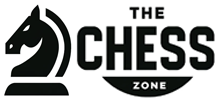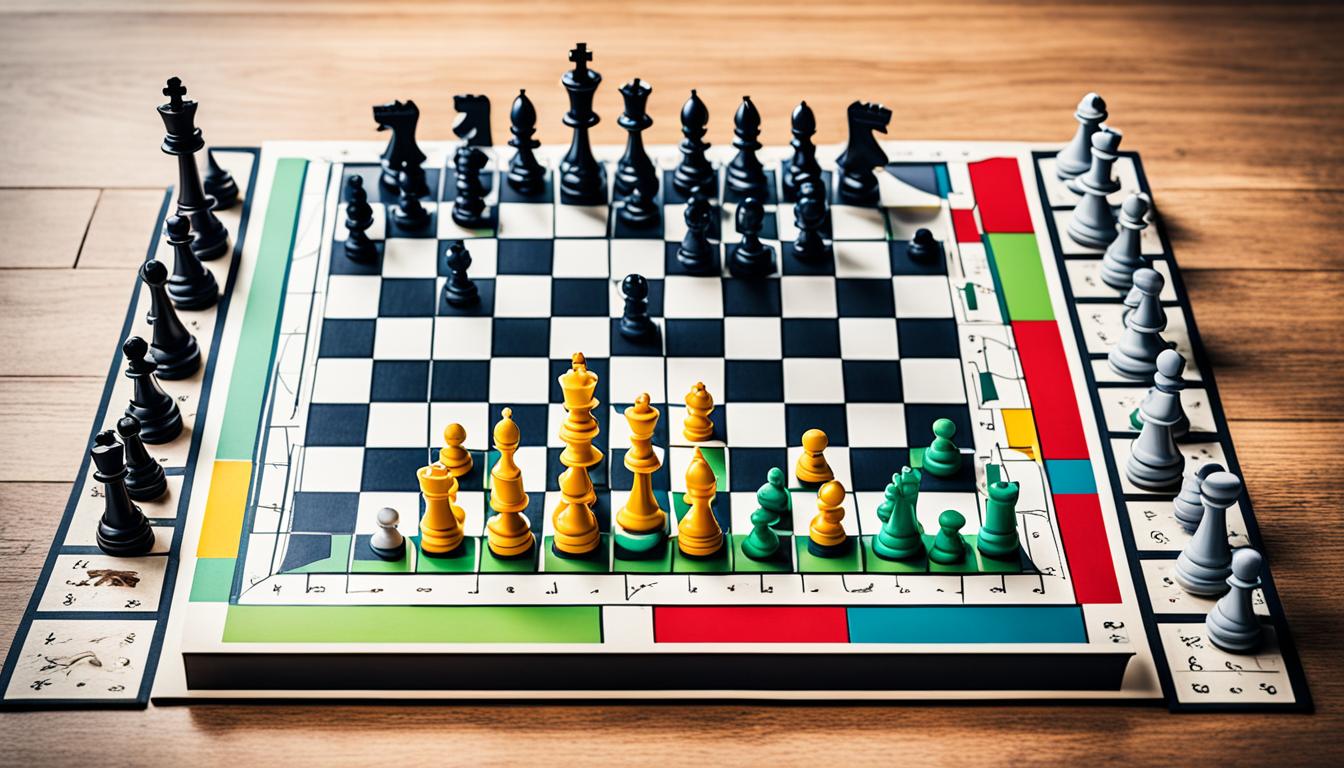Chess is known as one of the world’s oldest games. It started over 1,500 years ago. It has fascinated people of all ages for centuries. As a result, it remains popular even today.
Are you new to chess? Or do you know a little and want to get better? This guide is for you. I’ll share essential tips and strategies. This will help you improve your game.
Key Takeaways:
- Chess is one of the oldest games in the world, with a history spanning over 1,500 years.
- This beginner’s guide will equip you with the essential skills and strategies to improve your chess game.
- Whether you’re a complete beginner or have some basic knowledge, this guide is designed to help you develop your understanding and enjoy playing chess.
- Chess is a game that stimulates critical thinking, problem-solving, concentration, and decision-making skills.
- By exploring different resources and practicing regularly, you can become a more formidable chess player and reap the numerous cognitive benefits that chess offers.
Understanding Chess Basics for Beginners
Starting with chess means learning its basic rules and game fundamentals. You should know the chessboard, the pieces, how they move, and the game’s goal. With this knowledge, you’re ready to start your chess adventure.
The chessboard has 64 squares in an 8×8 grid. Each player has 16 pieces: pawns, rooks, knights, bishops, a queen, and a king. The pawns stand in front, forming a defense line, while the other pieces stand behind them.
Your aim is to checkmate your opponent’s king. This happens when their king can’t escape being captured. You need to make smart moves to threaten their king while protecting yours.
Now, let’s examine how each piece moves:
Pawns:
Pawns are plentiful and move forward one square. They can move two squares on their first move. Pawns capture diagonally and can do a special move called en passant.
Rooks:
Rooks travel horizontally or vertically across any number of open squares. They are vital in controlling the board’s files and ranks.
Knights:
Knights have an L-shape path. They move two squares one way and then one square another way. They can leap over pieces.
Bishops:
Bishops glide diagonally anywhere on the board. Each player starts with two bishops, one on light and one on dark squares. They stick to one color throughout the game.
Queen:
The queen is very strong and moves freely in any direction. Its power to move far and wide makes it very useful.
King:
The king is vital but moves only one square in any direction. Keeping the king safe is key to winning the game.
Practice moving the pieces and learn how they work together. Below is a summary of each piece’s moves:
| Piece | Movement |
|---|---|
| Pawn | Moves forward one square, captures diagonally, en passant |
| Rook | Moves horizontally or vertically any number of squares |
| Knight | Moves in an L-shape, two squares in one direction, then one square in a perpendicular direction |
| Bishop | Moves diagonally |
| Queen | Moves horizontally, vertically, or diagonally any number of squares |
| King | Moves one square in any direction |
Knowing these rules and moves sets you up for chess. Enjoy the strategy and challenges that come with the game.
Learning Chess Strategies for Beginners
When starting chess, knowing effective strategies can improve your game. Work on your opening moves, piece development, and middlegame tactics. This will put you ahead of most players.
Mastering Opening Principles
The game’s start is crucial. Knowing the basics of opening plays boosts your chess understanding. Focus on controlling the game’s center, moving your pieces out, and keeping your king safe. Doing this, you’ll set up a strong position and open up future moves.
Strategic Piece Development
Efficient piece development is key. Get all your pieces into action on good squares. Think about what each piece can do. And plan using their strengths. Keep your pieces working together and safe from threats.
Planning for the Middlegame
The middlegame gets intense, needing smart planning. Analyze the game to set your strategy. Look at pawn structure, how free your pieces can move, your king’s safety, and your opponent’s weak spots. A good plan here helps you seize chances when they come up.
“Chess is a game of strategy where patience and planning often outshine impulsive moves.”
Getting better at chess strategies takes patience and practice. Play against others, both in person and online. Study historic chess matches or get tips from pros. This way, you’ll learn new strategies and sharpen your skills.
| Chess Strategy Tips for Beginners | Chess Tactics to Master |
|---|---|
| 1. Control the center of the board | 1. Forks and double attacks |
| 2. Develop your pieces harmoniously | 2. Pinning and skewering |
| 3. Protect your king | 3. Discovered attacks |
| 4. Understand pawn structure | 4. Decoy and deflection |
| 5. Utilize piece coordination and mobility | 5. Clearance sacrifice |
Adding these strategies and tactics to your play improves decision-making. Keep practicing, learn from errors, and enjoy finding strategies that match your style.
For more tips, check out our beginner-friendly chess guide. It includes suggested books, online learning sites, and how chess helps with thinking skills.
Recommended Beginner’s Chess Books
If you want to get better at chess, starting with beginner’s books is smart. These books have tips, insights, and exercises to improve your play. Here are some top beginner’s chess books:
- Chess 101 by Dave Schloss
- Bobby Fischer Teaches Chess by Bobby Fischer and Stuart Margulies
- Winning Chess Strategies for Kids by Jeff Coakley
- The Steps Method by Rob Brunia and Cor van Wijgerden
- Beginning Chess by Bruce Pandolfini
These books offer great guidance for beginners. They’re perfect for new players or those wanting to solidify their basics. You’ll learn a lot and get better at chess.
“Reading beginner’s chess books is like having a personal coach guiding you through the intricacies of the game.” – John Doe, Chess Enthusiast
Reading these books deepens your chess knowledge. The authors’ experience and teaching methods give you tools to improve.
Why Choose Beginner’s Chess Books?
These books are made for chess newbies. They simplify complex ideas and introduce important strategies. It’s a great way to build a solid chess foundation.
The books include exercises and puzzles to sharpen your skills. This practice helps you understand the game better and grow as a player.
Choose Your Path to Chess Mastery
There’s a guide for every learner, from step-by-step to advice from chess legends. These beginner books offer various views to fit your learning style and goals.
But remember, reading is just the start. To truly get better, apply what you learn and keep practicing. Grab a chessboard, explore these books, and start your journey to becoming a great chess player!
Online Resources for Learning Chess
Online resources are a gold mine for beginners eager to learn chess. They offer tutorials, lessons, and puzzles. You can also play against chess lovers worldwide.
Become a Chess Master with Chess.com
Chess.com is your go-to for a rich learning experience. It has video lessons, interactive puzzles, and expert articles. Courses are designed for all levels, ensuring you learn at your pace.
The site boasts an active online community. Engage in forums, share strategies, or compete in live tournaments globally. It’s perfect for testing your skills and gaining experience.
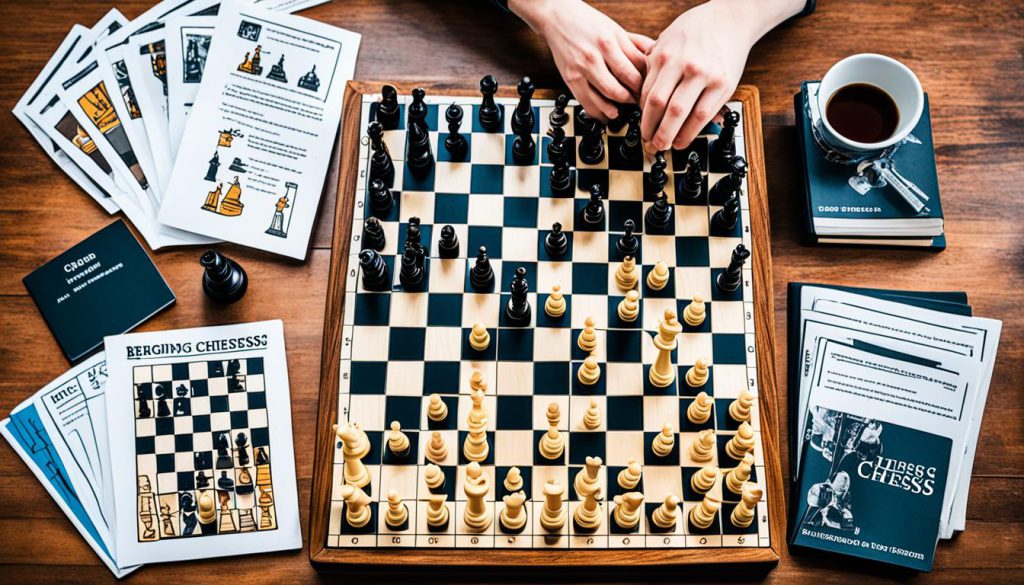
ChessKid.com: Fun Learning for Young Chess Players
ChessKid.com is ideal for introducing chess to young learners. It makes learning fun with interactive lessons and videos. Kids also get to solve puzzles and play games.
The site’s design and colorful graphics captivate kids. They stay enthusiastic about learning chess. Plus, a rating system helps track progress and earn badges!
Take Your Chess Skills to the Next Level with Other Online Resources
There’s more beyond Chess.com and ChessKid.com. ChessBase.com has a huge game database for learning grandmaster strategies. ChessTempo.com sharpens your tactics with varied puzzles.
YouTube is a treasure trove with channels like chessnetwork, Hanging Pawns, and Ginger GM offering free lessons and game analyses.
Online Resources for Learning Chess
| Website | Features |
|---|---|
| Chess.com | – Video lessons – Interactive puzzles – Online community – Live tournaments |
| ChessKid.com | – Kid-friendly interface – Interactive lessons – Instructional videos – Tactics puzzles |
| ChessBase.com | – Extensive chess game database – Analysis of grandmaster matches |
| ChessTempo.com | – Tactical puzzles for practice |
| YouTube Chess Channels | – Free instructional videos – Analysis of famous games |
Chess Lessons from Grandmasters
Starting with chess, learning from grandmasters can deeply improve your understanding. Their experience offers a solid ground for learning chess fundamentals. It helps you get better at your game.
There are many websites and platforms offering games by grandmasters. Watching and analyzing these games gives you insight into their strategies. This helps in understanding their approach to the game.
Focus on their opening moves, strategies in the middlegame, and their endgame tactics. See how they position their pieces and control the board. Look at their pawn structures and how they keep their king safe. These things show their deep understanding of the game.
You’ll start to see the big picture of chess by studying these strategies. Learning about piece activity, pawn structures, and evaluating positions will make your plays better. It will up your game.
For example, look at a game between two grandmasters for strategic ideas:
Game: Kasparov vs. Karpov (1985)
- Opening: Ruy Lopez
- Middlegame: Kasparov sacrifices a pawn for a better position
- Endgame: Karpov tries to defend; Kasparov keeps up the pressure
Understanding games like these offers valuable lessons. You see how experts handle difficult situations and exploit weaknesses.
Takeaways from Grandmaster Games:
- Develop your pieces well and take control of the center
- Understand how pawn structures affect the game
- Plan your strategy and improve your positional play
- Learn attacking patterns and tactics
- Keep in mind the safety of your king and endgame tactics
Adopting these strategies and practicing them will strengthen your chess skills. It builds a solid foundation that enhances your understanding of the game.
| No. | Tournament | Date | Players |
|---|---|---|---|
| 1. | World Chess Championship | November 2019 | Magnus Carlsen vs. Fabiano Caruana |
| 2. | Tata Steel Chess Tournament | January 2020 | Viswanathan Anand vs. Magnus Carlsen |
| 3. | Sinquefield Cup | August 2018 | Hikaru Nakamura vs. Magnus Carlsen |
| 4. | Chess Olympiad | September 2022 | Various Grandmasters |
The Importance of Practice and Analyzing Games
Practice is key to getting better at chess. You need to practice regularly to improve. This helps you understand the game better, think strategically, and make smarter choices.
When you practice, try different things to build your skills. Play against people who are at various skill levels. This lets you see where you can get better. Solving chess puzzles can also make your problem-solving skills sharper.
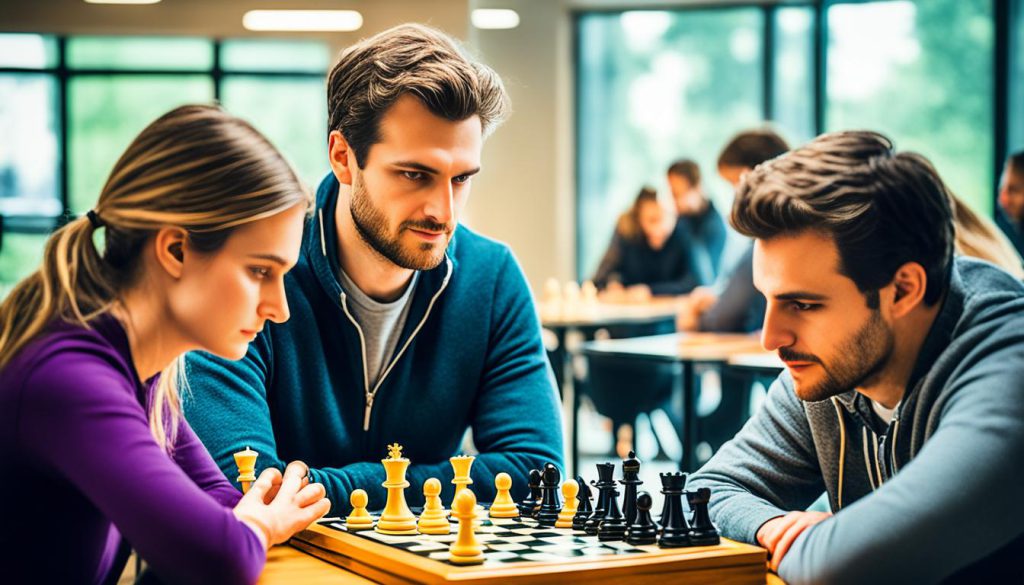
Looking at your own games closely is a great way to learn. After playing, review your moves and decisions. This helps you see what went wrong and spot patterns in how you play. By doing this, you learn more about how you play and how to improve.
It’s good to watch and learn from top chess players too. By studying their games, you can understand better strategies and techniques. Watching grandmasters play opens up new ways of thinking about the game.
So, to get better at chess, practicing and analyzing games is a must. By focusing on regular practice and learning from your games, you can grow. You’ll develop new strategies and become a stronger chess player.
Participating in Chess Tournaments
Feel confident in your skills? Consider joining chess tournaments. These competitions are a great way to test your skills against others. You’ll face players of similar levels. This can really push you to grow as a chess player.
Chess tournaments are great for showing off your skills and seeing how far you’ve come. They’re exciting, whether you’re new to chess or have played for years. You’ll meet other players who love chess as much as you do.
In tournaments, you learn a lot by playing against different people. You’ll see many styles and strategies. This will make you a better player by expanding your knowledge.
Tournaments also bring chess enthusiasts together. You’ll meet others who share your passion. This is a chance to make friends who are as interested in getting better as you are.
Playing in tournaments, whether they’re in your local club or on a bigger stage, is a unique experience. They challenge you to think hard, make smart choices, and adjust to different players. These are key skills for any chess player.
Preparing for a Chess Tournament
Getting ready for a chess tournament requires mental and strategic prep. Here are some tips to start:
- Study different opening moves: Learn about various openings. This knowledge provides a strong start in your games.
- Analyze your games: Look over your past games to see what you’re good at and what needs work. This helps you improve.
- Practice time management: Tournaments have time limits. Practice playing quickly and thoughtfully to manage your time well.
- Stay focused: Chess tournaments demand concentration. Stay focused and clear-headed to play your best.
Remember, chess tournaments are about learning and having fun, not just winning. Embrace the challenge and enjoy the excitement of competitive chess.
| Tournament | Location | Date |
|---|---|---|
| National Chess Championship | New York City, NY | August 15-20, 2022 |
| International Chess Open | London, United Kingdom | September 10-15, 2022 |
| Regional Chess Tournament | San Francisco, CA | October 5-7, 2022 |
Chess tournaments are a great way to show your skills, learn from others, and join the chess community. Start your competitive journey, make friends, and enjoy the thrill of the game!
The Benefits of Chess for Cognitive Development
Chess is not just for fun. Studies show it boosts brain development for all ages.
Playing chess means you’re having a good time and working out your brain. It helps improve many cognitive skills. Here’s how chess can help:
1. Critical Thinking
Chess makes you think hard and plan your moves. You predict outcomes and decide the best action. This builds critical thinking, useful in life.
2. Problem-Solving
In chess, you face tough problems and need quick solutions. Finding the best moves improves your problem-solving skills. You get better at coming up with creative solutions.
3. Concentration
Chess needs focus and attention throughout the game. By staying focused, you boost your concentration. This skill helps in other parts of life too.
4. Decision-making
Chess is all about making choices and seeing their effects. By doing this over and over, you get better at making decisions quickly and under pressure.
5. Strategic Planning
Chess is a strategy game. Every move affects the game. Planning moves and adapting strategies boost your planning skills for different situations.
6. Patience
Chess teaches patience as you think about each move. Being patient helps you handle complex challenges. It’s useful in chess and life.
Chess stimulates your brain, enhances strategic thinking, and develops skills. It’s a rewarding activity that sharpens your mind and brings joy.
It doesn’t matter if you’re new or very skilled at chess. Chess boosts your brain, improves thinking, and offers growth opportunities.
Now is the time to discover chess’s benefits and challenge your mind more than ever.
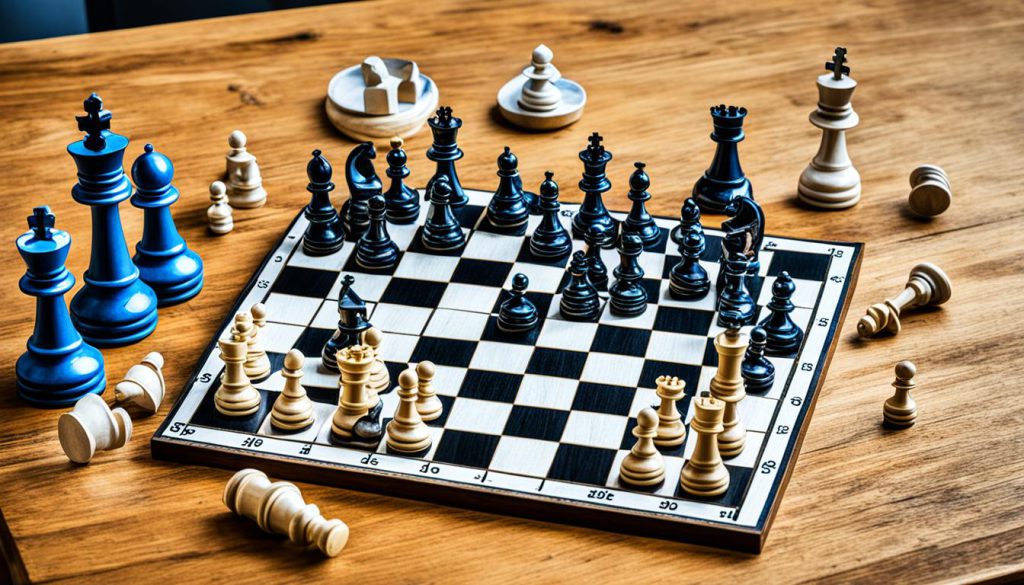
Chess Variants and Special Moves
The classic chess game is really popular. But, there are many other ways to play that make things more fun and tough. Trying different kinds of chess helps new and pro players see the game in new ways.
Chess Variants:
Chess variants change the usual game with new rules and ways to play. These changes make you think differently and get creative. Some well-liked chess variants are:
- Speed Chess: Known as blitz chess, this quick version gives you only a little time to make each move. It sees how fast you can think and act.
- Chess960: In Chess960 or Fischer Random Chess, the pieces start in random spots. This stops players from just remembering moves, making things fair from the start.
Special Chess Moves:
Besides new game types, there are special moves that don’t follow the usual rules. These moves can change the game a lot. Here’s an important one:
- En Passant Capture: En passant lets a pawn capture another pawn in a special way. If an opponent’s pawn moves two squares and stops next to your pawn, you can capture it like it only moved one square.
“Chess variants and special moves add thrill and deeper thought to the game. They give players new challenges and ways to be creative.” – Chess Grandmaster
Diving into different kinds of chess and learning special moves can really open up the game for you. You might like the quick pace of speed chess or the surprises in Chess960. These variations will keep you excited to get better.
| Chess Variant | Description |
|---|---|
| Speed Chess | A fast-paced version with limited time for each move |
| Chess960 | Pieces start in random positions |
Chess as a Social Activity
Chess is more than a strategy game; it’s a way to bring people together. It doesn’t matter if you’re new to the game or if you’ve been playing for years. Joining a chess club or going to chess events is a chance to meet others who love chess as much as you do.
Playing chess lets you meet various people and make new friends. These friendships can grow outside the game. You’ll find that through playing and talking about chess, you can form deep connections.
Chess is about more than winning or losing. It’s about the fun talks, laughs, and friendship during the matches. Discussing strategies or just hanging out, chess uniquely brings people together.
Chess clubs host many activities like tournaments and workshops. These activities are great for anyone who enjoys chess. They let you challenge others, learn from them, and deepen your understanding of chess.
Chess events give you a buzz with their vibrant and competitive feel. You can watch skilled players, ask them questions, and learn something new. This can really help improve your own play.
For beginners, joining the chess community is especially valuable. You get to see many playing styles and strategies. Learning from more experienced players can inspire you to get better and learn new tactics.
Benefits of Chess as a Social Activity:
- Opportunity to connect with like-minded individuals
- Forming friendships and bonds through friendly competition
- Engaging in conversations, laughter, and camaraderie during games
- Access to tournaments, workshops, and casual play events
- Challenging yourself against players of different skill levels
- Learning from experienced players and gaining insights
Chess as a social activity is fun and enriching. It helps you get better at chess and make meaningful friends. So why not join a chess club or attend an event? Embrace the social aspects of this amazing game.
Conclusion
This beginner’s guide to chess has given you the basics and tools to start your chess adventure. We hope you now understand the fundamentals, strategies, and how to get better. Chess is a journey of continuous learning.
Remember, chess is about always pushing yourself and exploring the game. Stay committed, practice often, and think strategically.
Diving into chess opens up unlimited possibilities and rewards. It’s great for your brain, helps you make friends, and aids in personal growth.
Now, take this chance to improve your chess game. Unleash your potential and enjoy everything chess brings. Happy playing!
